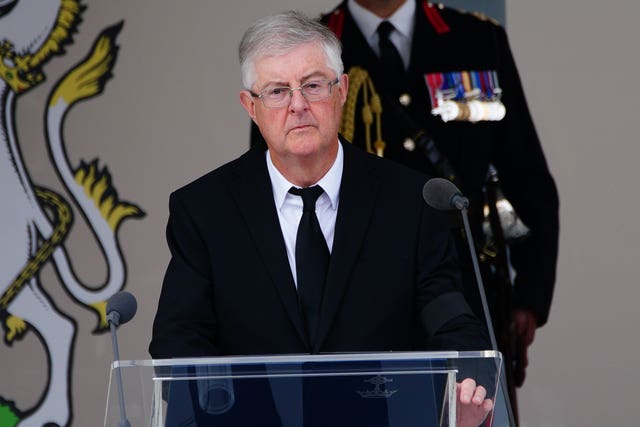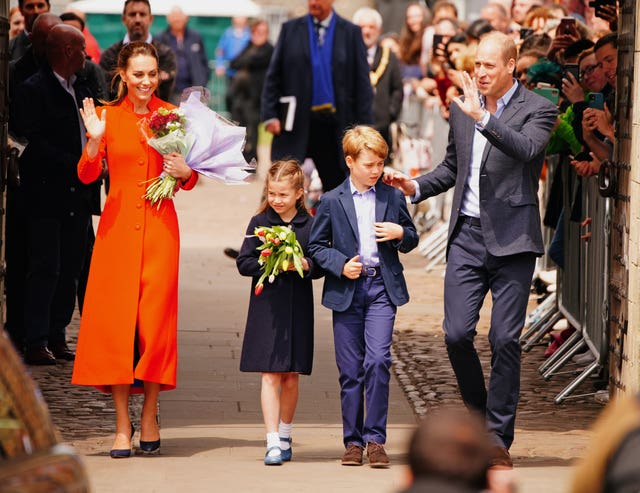A petition calling for the end of the Prince of Wales title “out of respect” for the Welsh has gathered more than 25,000 signatures as King Charles prepares to visit the country.
King Charles declared his eldest son, William, Prince of Wales during his first speech as monarch the day after the death of his mother Queen Elizabeth II.
He also made William’s wife, Kate, Princess of Wales, the first time the title has been held by anyone since Princess Diana.
Charles has held the title since he was nine, his investiture later taking place in 1969 at Caernarfon Castle, North Wales, when he was 20.
Protests at the time coincided with the ceremony, including a bomb plot coordinated by Welsh paramilitary group Mudiad Amddiffyn Cymru (MAC).
Now the King’s decision to bestow the title on to his son has sparked fierce debate in the country.

The page on the petition website, which continues to gather supporters, reads: “The title remains an insult to Wales and is a symbol of historical oppression.
“The title implies that Wales is still a principality, undermining Wales’ status as a nation and a country.
“In addition, the title has absolutely no constitutional role for Wales, which is now a devolved country with a national Parliament.”
It also claims neither the “Welsh parliament nor the people of Wales were notified, let alone consulted” about the decision to name William Prince of Wales.
Wales’ First Minister Mark Drakeford confirmed in an interview with Radio Cymru that he had not been told before the King’s announcement.
There will be time, in due course, for a public debate surrounding the title of the Prince of Wales.
It is Plaid Cymru’s long held view that it should be the people’s democratic right to have a final say on this matter in an independent Wales.
— Adam Price 🏴🏳️🌈 (@Adamprice) September 9, 2022
He has said a debate on the subject would be “absolutely proper” but that it should be left until some time after the Queen’s funeral on Monday.
Adding: “We look forward to deepening our relationship with the new Prince and Princess.”
The petition goes on to quote actor Michael Sheen from an interview with political journalist Owen Jones, during which he revealed he had handed back his OBE in 2017.
Mr Sheen said he did not want to be a “hypocrite” after researching Welsh history for his Raymond Williams Memorial Lecture speech in 2017, and wrote to the then Prince Charles explaining he meant “absolutely no disrespect”.
He said: “Make a break there. Put some things that have been the wrongs of the past right.

“Don’t necessarily just because of habit and without thinking just carry on that tradition that was started as a humiliation to our country.”
He added: “When that change and the traditional requirements would mean the Prince of Wales would become a new person, and a new Englishman, it would be, I think, a really meaningful and powerful gesture for that title to no longer be held in the same way as it has before. That would be an incredibly meaningful thing I think to happen.”
A similar sentiment was expressed by Plaid Cymru leader Adam Price during his tribute to the Queen at the Motion of Condolence session held in the Senedd on Sunday.
Mr Price referenced moments throughout Queen Elizabeth’s reign when she broke with the status quo, including when she bowed her head at the garden of remembrance in Dublin during her first visit to the Irish Republic.
And he said: “Perhaps, as Queen Elizabeth begins her final journey and we consider what the future holds, we can follow the Queen’s own injunction in that great Dublin speech to bow to the past, but not be bound by it.”
The ‘Prince of Wales’ title has been held exclusively by Englishmen as a symbol of dominance over Wales.
To this day, such Princes of Wales have no genuine connection to our country.
The title remains an insult to Wales. It should end.https://t.co/dqB71N5uYW
— Owen Williams 🏴 (@OwsWills) September 11, 2022
In a tweet following Charles’ announcement, Mr Price said: “It is Plaid Cymru’s long held view that it should be the people’s democratic right to have a final say on this matter in an independent Wales.
“For now, Plaid Cymru’s thoughts are with the Royal Family as they grieve.”
The last native prince of Wales was Llywelyn Ap Gruffudd, also known as Llywelyn the Last, who was the prince of Gwynedd, a region in north Wales.
Llywelyn was killed by English soldiers in 1282 and almost 30 years later Edward I gave the title to his son Edward II.
Since then the title has been reserved for the heir to the British throne, however there have been long periods when the title has not been used.

On Friday, the King will visit Wales for the first time since his ascension to the throne.
One of the locations he will visit in Cardiff, Llandaf Cathedral, has been rumoured in the Telegraph to be where the investiture of the new Prince of Wales could take place next year.
A statement released by Kensington Palace said the Prince expressed that he and Catherine would “do their part to support the aspirations of the Welsh people”.
“The prince and princess look forward to celebrating Wales’s proud history and traditions as well as a future that is full of promise.”




Why are you making commenting on The National only available to subscribers?
We know there are thousands of National readers who want to debate, argue and go back and forth in the comments section of our stories. We’ve got the most informed readers in Scotland, asking each other the big questions about the future of our country.
Unfortunately, though, these important debates are being spoiled by a vocal minority of trolls who aren’t really interested in the issues, try to derail the conversations, register under fake names, and post vile abuse.
So that’s why we’ve decided to make the ability to comment only available to our paying subscribers. That way, all the trolls who post abuse on our website will have to pay if they want to join the debate – and risk a permanent ban from the account that they subscribe with.
The conversation will go back to what it should be about – people who care passionately about the issues, but disagree constructively on what we should do about them. Let’s get that debate started!
Callum Baird, Editor of The National
Comments: Our rules
We want our comments to be a lively and valuable part of our community - a place where readers can debate and engage with the most important local issues. The ability to comment on our stories is a privilege, not a right, however, and that privilege may be withdrawn if it is abused or misused.
Please report any comments that break our rules.
Read the rules hereLast Updated:
Report this comment Cancel